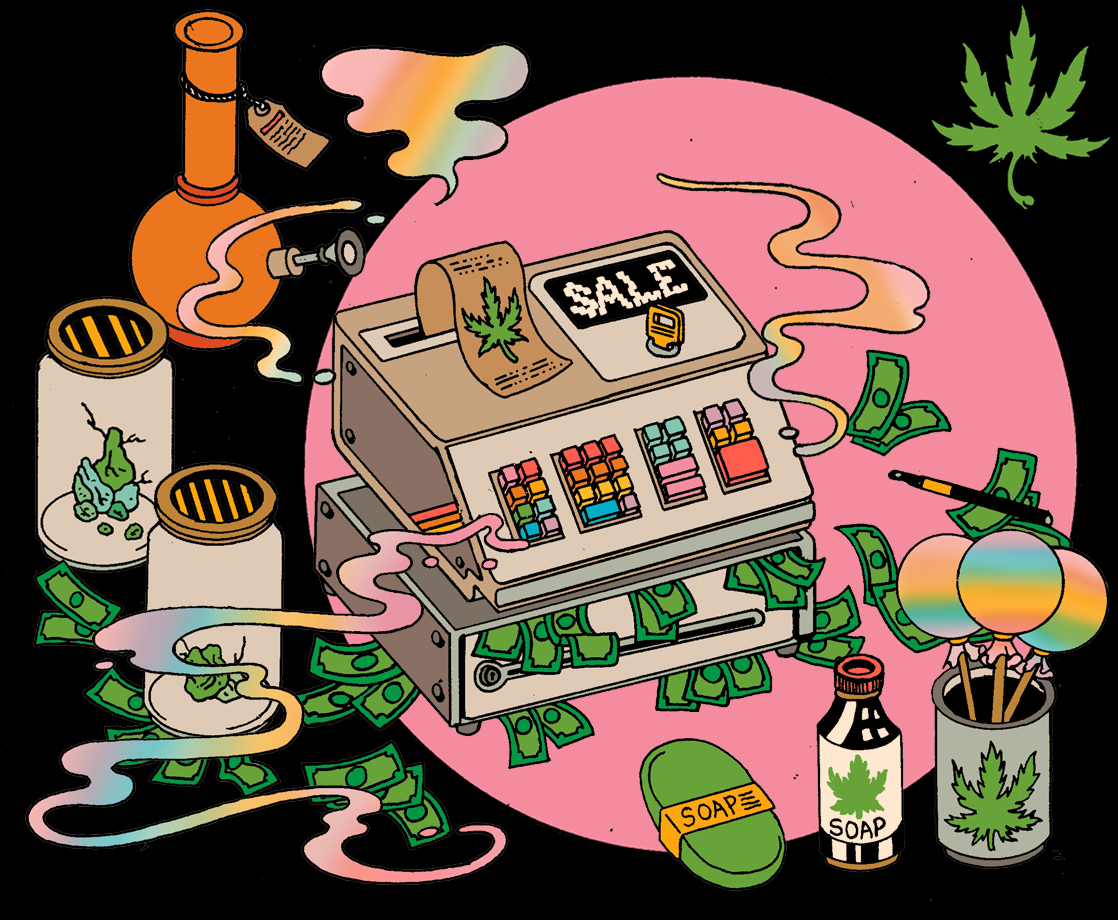Lead illustration by Brian Blomerth
In 2018, California dispensaries were simply looking to get themselves legal and open as quickly as possible. Now, with another year of adult-use sales under the state’s belt, the focus has somewhat shifted. While the practical challenges of obtaining the permits, regulatory permissions, and capital to get a dispensary up and running remain sizeable, the vision for what a California dispensary can be has unquestionably begun to expand.
For Steve DeAngelo of Harborside (who spoke with MERRY JANE for a similar feature last year) that meant making good use of a loophole that allowed his company to open the state’s second drive-thru cannabis dispensary, Harborside Desert Hot Springs, in December. In the case of famed cannabis breeder Mario Guzman a.k.a. Mr. Sherbinksi, it was the chance to situate his brand with a flagship dispensary, SHERBINSKIS, located on Fairfax Avenue in Los Angeles.
Meanwhile, the cannabis brand Caliva opened DELI in Bellflower (just outside of LA) in November. This dispensary is themed to resemble a 1950s New York delicatessen, including vintage café stools, a window counter, and plenty of quality contemporary cannabis products. Elsewhere, The Farmacy from Glasshouse Farms CEO Graham Farrar, became Santa Barbara’s first dispensary to open its doors when it launched in August, while multi-state operator Harvest House of Cannabis did the same in Northern California by opening Napa’s first dispensary back in January.
To get a better picture of the challenges and rewards of launching a hotly anticipated dispensary in 2019, we spoke with the people behind these five hyped new California pot shops about staying relevant, weathering the vaping crisis, and how state taxes have shaped the market.
Interviews have been edited for clarity and length.
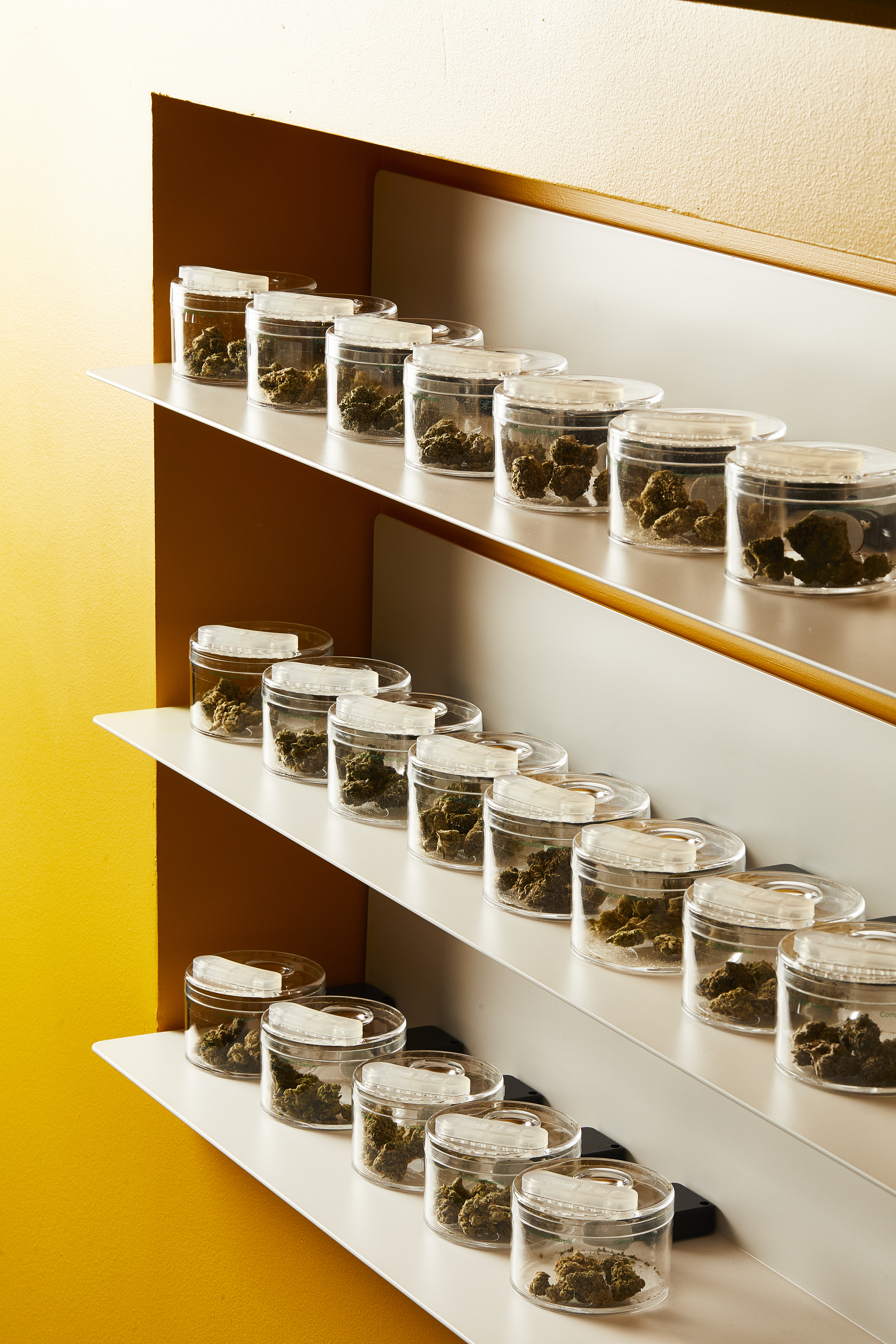

Photos via Harvest HOC
MERRY JANE: What stands out to you about opening a dispensary in 2019?
Dennis O’Malley, CEO of Caliva / DELI (Los Angeles): As cannabis becomes more widely accepted and readily available, discerning consumers are looking for products, brands, and stores they can trust and depend on. Consumers seek trusted experts to help them navigate the endless choices of cannabis products these days.
Designed to cater to cannabis connoisseurs, DELI offers a full-service experience, providing more than just a transaction for each shopper. The store resembles a traditional deli, with a friendly vibe designed to evoke the nostalgia of great customer service in a trusted neighborhood environment.
Mario Guzman, Founder of SHERBINSKIS (Los Angeles): For us it’s about having SHERBINSKIS’s first flagship on a street as iconic as Fairfax, and having a place to showcase our genetics and new products. It’s been a long time coming. We’re just happy to have gotten through the regulatory process and to be able to open our first store.
Graham Farrar, Owner, The Farmacy (Santa Barbara): One thing that stands out to me is that it took from 2016 to the end of 2019 for a progressive town like Santa Barbara to open a dispensary. That’s kind of a mind-blowing. When we opened the store, I wasn’t sure if it was going to be crickets. I thought it might take nine months before we even had a clientele or we might have people lined up out the door. Maybe there would be protesters with picket signs saying we were ruining the neighborhood. We landed right in the middle.
On opening day, we had a line around the block. We had a full party and it was the cover story for basically every publication in Santa Barbara. Since then, things have clicked where now we’ve got regulars who come multiple times a week and we even get a few famous people. I was at a place having lunch and the lady at the counter bought me lunch to thank me for opening The Farmacy. She said she used to have to drive an hour away to get her medicine, but now it’s just a five-minute drive across town. It just shows how much power there is in this plant and how we’re so on the right side of history, I think, in what we’re doing.
Alex Howe, Head of Corporate Communications for Harvest HOC (Napa): Local markets are very different from one another. State to state and even within larger markets, differences in products, format, and reported use vary widely. We’re incredibly focused on improving patient access across the country, profitability, and operational excellence. Opening a dispensary and operating it effectively means ensuring you select a market with demand, has the proper supply and infrastructure to support it, and works best when you’re a part of the community in which you operate.
Steve DeAngelo, Co-Founder of Harborside (Desert Hot Springs): It’s a less complex and complicated undertaking because the retail operations are less complex. In the world before January 1, 2018, we were taking in mostly raw bulk cannabis from small growers and small collectives. We would test that cannabis, and after we got the test results back, then we would package it and put it out for sale.
Now the supply chain is a lot easier. You don’t need to have a processing room. You don’t need to have dozens of employees whose job is to turn bulk packages into retail-ready packages. You also don’t, by and large, need to do the testing because the way that you get your supply now is that you get a few deliveries every week from distributors and the products are already ready to go on your shelf. They’ve already been tested. A lot of what we needed to do before January 1, 2018 has just been moved to other parts of the supply chain now.
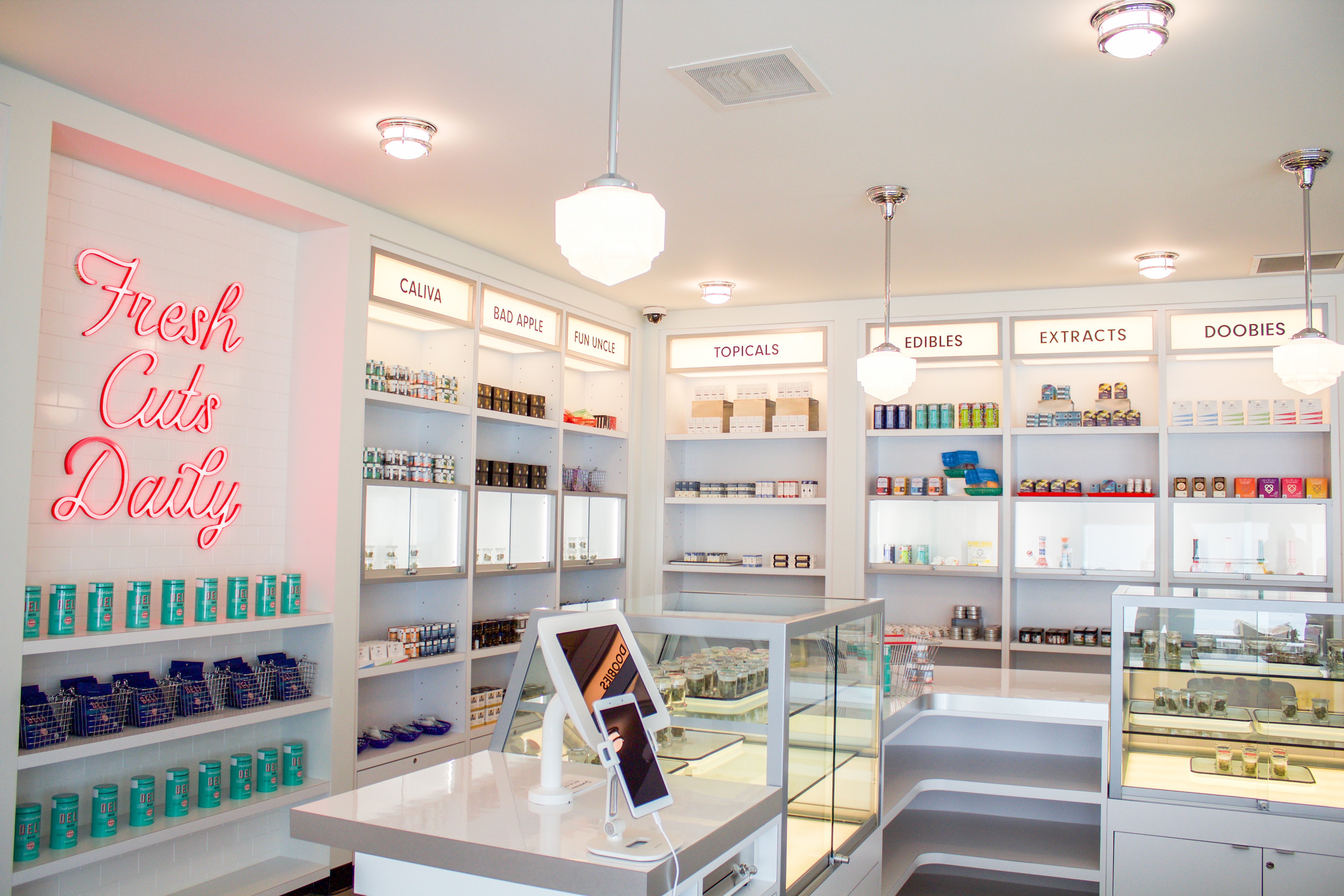

Photos via Caliva x DELI
MERRY JANE: Did all the fervor over “vapegate” and the EVALI health crisis result in customers shifting away from purchasing vaporizer products? If so, has the pendulum swung back the other way yet?
Dennis O’Malley / DELI: We have seen a slight change in basket mix (5-7%) of customers purchasing pre-rolls over vapes, which has led to an increase in our Dogwalker and Toasties product sales.
Mario Guzman / SHERBINSKIS: I think that when this happened, it definitely affected the market and we saw a downturn, but as people became more educated on what the problem really was (i.e. the illicit market), we’re seeing a shift back. People are understanding where the dangers really come from. For example, there have been numerous investigative reports published that isolate the illicit market brands that are most active. With that information coming forward, people are coming back to us to buy vaporizers again. Also, SHERBINSKIS has always been a flower brand at heart, so even though vaporizers are a large part of our business, flower is still our main focus. That will never change. We’re happy to be in different categories like vaping and are also in the process of developing a full edibles line with our first product being vegan gummies.
Graham Farrar / The Farmacy: It was interesting to watch. I think Santa Barbara tends to be a pretty flower heavy town. I think we over index for flower relative to the rest of the state, so we’re already skewed in that direction. With “vapegate,” it was more of a fear than a reality. It was an irrational thing, but I also think it actually highlighted why licensed regulated cannabis is important. People have been vaping cannabis for a decade and now, all of a sudden, in six weeks, we had 1000 cases of this illness? To me, that doesn’t suggest there’s a broad issue with vaping — it suggests something happened. We know it’s not a broad issue.
The CDC identified the problem as Vitamin E acetate and really nailed it down to one product, Honey Cut, which was used as a cutting agent in illicit vapes so they could dilute their product and make more money. The one safe place to buy a vape is at a licensed dispensary. It’s the upside to regulation and taxation, right? I think when people realized that they had a store with a staff who could speak intelligently to them about this whole thing, a staff that knew every single product in there and how each was tested, it actually made customers happier about the choices that they were making. We had a decent amount of conversations, and, in almost all cases, once people understood the actual details of it, they shopped with confidence.
Alex Howe / Harvest HOC: In the states in which we operate, we did not see a statistically significant drop in vape sales. Any slight shift was made up for in other format sales, including flower and edibles. As a responsible operator, we take significant efforts to educate our patients and customers about what is in their products and have simplified our rigorous testing and commitment to high-quality vape pens and cartridges through our CannApprove program.
Steve DeAngelo / Harborside: Much ado about nothing from our point of view. We understand, and our clientele understands, that the contaminated vape pens were creatures of the unregulated market, with the exception of one report — which is of questionable veracity — of a pen supposedly coming from a licensed dispensary in Oregon. Every single other case has been traced back to a purchase from an unlicensed, underground source. We have not seen any significant dropoff in vape pen sales, but we haven’t seen any significant increase in vape pen sales, either. They’re just running steady. It didn’t really affect us at all.
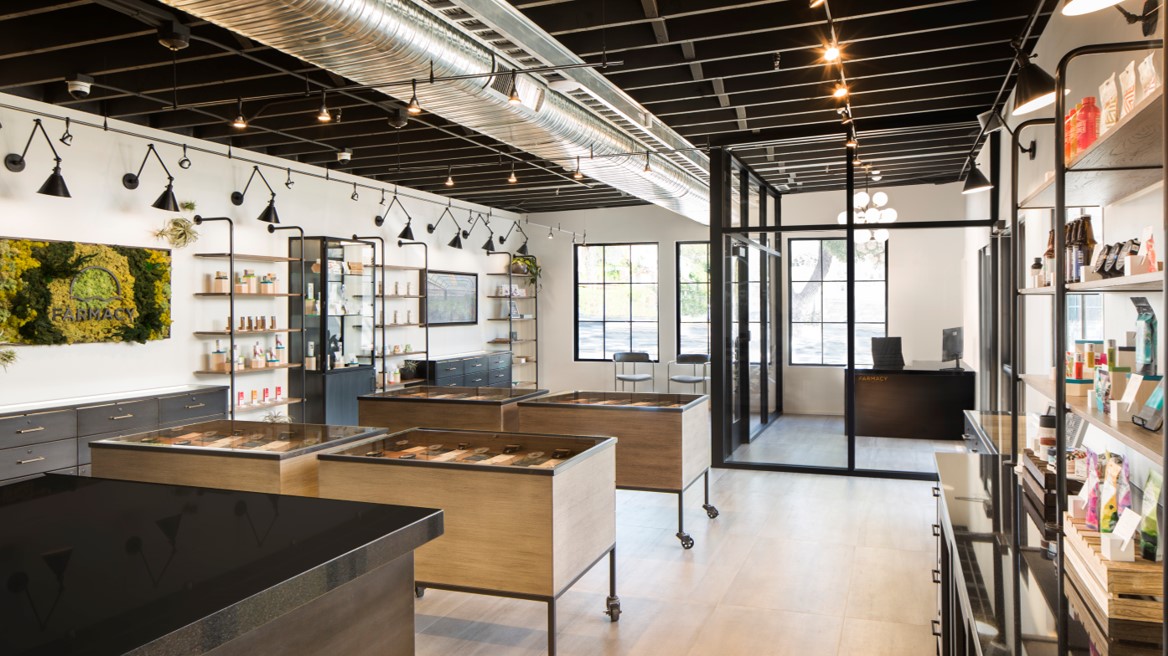
Photos via The Farmacy
MERRY JANE: Do you feel that California’s tax rates are compatible with what it takes to open and operate a dispensary in 2019? Are any changes needed heading into 2020?
Dennis O’Malley / DELI: From a consumer perspective, taxes are too high and, more importantly, too confusing. Each municipality has different taxes for different parts of the business. If California wants the legal dispensaries to outperform the illegal dispensaries, they should have consistent and clear taxes and use those funds to continue to provide enforcement against illegal dispensaries and help clearly distinguish a legal dispensary from an illegal dispensary — think Good Housekeeping seals and public service announcements.
Mario Guzman / SHERBINSKIS: Just recently, they’re proposing another tax increase that makes it more difficult to operate, especially since there are still dispensaries operating in the illicit market in California and we’re competing against them. I’d like to see taxes stay where they’re at and also see our lawmakers continue to take a closer look at any area where they feel it can be adjusted to help the business owners in California. We’re up against a large underground market, which means people in our space, like SHERBINSKIS, who are doing it in the right way, need assistance from the state to make sure we continue to operate.
Graham Farrar / The Farmacy: From a regulation and taxation point of view, California is sitting in the worst possible scenario. There are two factors: taxation and the enforcement of unlicensed shops. If your goal is to encourage the black market, right now, what California is doing is perfect. I want to write a parody letter thanking the state for all they’ve done and for always having our backs and then sign it on behalf of the illicit market.
What the state has decided to do is to both tax the guys who follow the rules and to not have any enforcement to stop the guys who don’t. That’s the scenario that creates this big disparity. If you apply this situation to any other industry, it’s obvious how crazy it is. Should I open a gas station that offers gas for half price and doesn’t pay any taxes? No, because I’d get shut down. But if we could get away with it, I guarantee you there would be gas stations that didn’t pay taxes. I think the state needs to do one of two things. If they’re not ready to actually go and enforce against people not playing by the rules, then they have to give the people who are playing by the rules a fighting chance and bring the taxes down. They can do either one and it would work.
Alex Howe / Harvest HOC: Significant taxes are one way to drive consumers to the illicit market, and we fully support a regulated market. States and municipalities should seek to balance their tax requirements with supporting regulated sales and driving consumers away from the illicit market. As 70% of municipalities in CA still ban all commercial cannabis activity, patient access is another key factor in consideration when operating in the state.
Steve DeAngelo / Harborside: Keeping any licensed dispensary open is challenging in California today because of the amount of unlicensed competition. The state of California did two incredibly foolish things at the same time. Number one: they allowed a system of taxation to come into place that has increased the retail price of cannabis 40-50% in most parts of the state. At the same time, they put in place a system of requirements for growers that was so expensive and so demanding that of the 10,000 or so growers who were supplying the legal medical cannabis market, only around 2,000 of them have managed to get [recreational] licenses.
On the one hand, you have consumers who are going into dispensaries and walking out with sticker shock, and on the other hand, they’re just walking into the open arms of growers who are looking for a market. That’s what’s happening in the state of California. Unbelievably, we just saw the California Department of Tax and Fee Administration raise cannabis taxes. It’s difficult to understand this recent tax increase by the CDTFA as anything other than intentional sabotage.
If California is serious about legalizing cannabis, I would like to see the state declare a cannabis tax holiday for a minimum of two years. If they really expect legal cannabis operators to convert the traditional unlicensed market into a legal, licensed market, then they’re going to have to use market mechanisms to make that happen. Part of that is a tax holiday. The other part of that is a significant relaxation of the regulatory requirements for smaller producers.
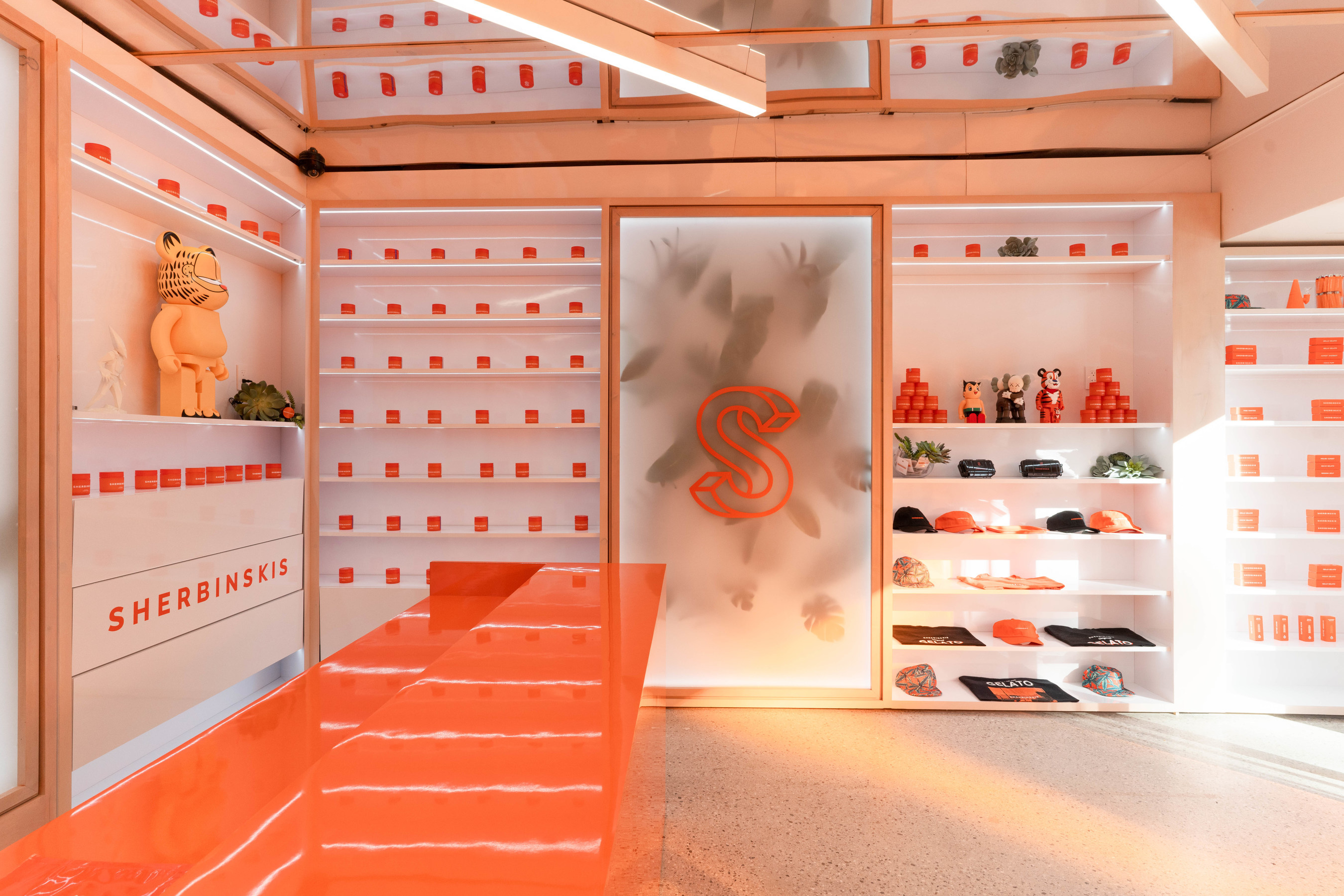

Photos via SHERBINSKIS
MERRY JANE: In terms of brands, products, and strains, what were your “MVP” sellers this year?
Dennis O’Malley / DELI: We are very partial to our own DELI brand of flower, which has been doing great in our store. Our customers love our holiday picks, which is headlined by our limited-edition Blitzen OG.
Mario Guzman / SHERBINSKIS: Our top sellers include 710 Labs Live Resin cartridges, Sherbinskis Live Resin cartridges, and Sherbinskis Mochi Gelato Flower.
Graham Farrar / The Farmacy: Flower does really well for us. Glasshouses is our number one selling product at the dispensary. Humble Flower’s Muscle Recovery Balm has been a real standout, which is interesting because it’s an entirely non-psychoactive product. I think it’s easy to forget that there’s a lot of ways that cannabis is beneficial and interesting to consumers outside of being stoned. The [infused] sodas have also been great. These are microdose beverages that don’t have a lot of calories and don’t leave you with a hangover.
I also think the Field is an example of next-level quality. All the vape pens in the industry are basically distillate-based, but now we’re seeing consumers’ education evolve to the point where they’re appreciating the live resin pens that Field makes. I think a lot of consumers have been drinking boxed wine, not realizing that the higher quality stuff is just one aisle over. It’s been fun to see that evolution taking place.
Jamie Bender / Harvest HOC: In the year that we have been open in Napa, it’s abundantly clear that we live in a predominantly sativa town. Most of our community members prefer the uplifting attributes of sativa strains, over the calming effects of indicas. We’ve also noticed that pre-rolls are always a top seller. We offer everything from little dog walkers to full packs. We also do very well in the topical department. Pain management is always a top concern among our patients, and we offer a variety of topicals for our community to try. And, of course, with our proximity to the Emerald Triangle, we enjoy fresh, top-shelf flower regularly and keep a wide variety of strains and price points on the wall.
Steve DeAngelo / Harborside: The $3 joints that we sell, with flower grown on our own farm in the Salinas Valley under the KEY brand, have been super, super popular. In order, the top five are: KEY flowers, Smokiez gummies, Lowell Herb Co. cold pressed vape pens, Alien Labs x Connected flowers, and Care by Design’s 1:1 pain cream.
Follow Zack Ruskin on Twitter


